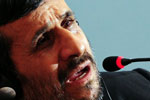 Wall Street Journal Europe: Ayatollah Khamenei’s political spectacle continues to fool Western observers.
Wall Street Journal Europe: Ayatollah Khamenei’s political spectacle continues to fool Western observers.
The Wall Street Journal Europe
Ayatollah Khamenei’s political spectacle continues to fool Western observers.
Opinion
By EMANUELE OTTOLENGHI
 In the ongoing clash between Iran’s supreme leader, Ayatollah Ali Khamenei, and its president, Mahmoud Ahmadinejad, analysts persist in trying to determine who’s the more moderate: the Holocaust-denying Ahmadinejad, or Khamenei, the patron of Tehran’s murderous revolutionary guards?
In the ongoing clash between Iran’s supreme leader, Ayatollah Ali Khamenei, and its president, Mahmoud Ahmadinejad, analysts persist in trying to determine who’s the more moderate: the Holocaust-denying Ahmadinejad, or Khamenei, the patron of Tehran’s murderous revolutionary guards?
One camp claims that Ahmadinejad’s apparent challenge to Iran’s clerical leadership and his emphasis on nationalism reflect a new pragmatism. With ordinary Iranians resenting clerical rule, Ahmadinejad’s collision course with the clerics and his aids’ reported quiet talks with U.S. officials seem to signal that he wants to accommodate the West.
Not so, retorts the other side: Clerics are more moderate, and if Khamenei loses his power struggle against Ahmadinejad, the result will be a hyper-nationalist military dictatorship. Such a regime might be less Islamic, but even more radical. This argument is bolstered by a recent Associated Press report, citing a leaked Western intelligence assessment, that claims that Ahmadinejad favors an openly confrontational nuclear policy. Khamenei, meanwhile, remains fearful of Western reprisals and prefers to keep Iran’s nuclear-weapons program out of sight.
The larger curiosity of this debate is that moderation, however we define it, is rarely the stick by which Iran’s leaders should be measured. And indeed, the current apparent clash is nothing more than a spectacle. Khamenei, who has remained firmly in command of the Islamic Republic since he acceded to power in 1989, periodically puts on such shows largely to confuse Tehran’s adversaries.
Nothing illustrates this better than Iran’s nuclear standoff with the rest of the world. Led by the five permanent members of the U.N. Security Council and Germany, the international community has negotiated with Khamenei’s Iran since its clandestine nuclear program was exposed in 2002. Tehran has responded with a cat-and-mouse game, which includes changing presidents and their political orientations as convenient. Iran has crossed every red line drawn by the Security Council and has ignored every ultimatum, without any consequence of note. Through all this, Iran has mostly managed to come on top. Sanctions were a setback, no doubt. But the time, effort, energy, and resources invested by America and its allies in getting the U.N. to approve them, to say nothing of their mixed results, are a testament to Iran’s diplomatic acumen and proof that its strategy is working.
As his nuclear scientists worked underground to master the secrets of the atom and his engineers developed ballistic missiles, Khamenei sent a parade of elected figures and emissaries to run circles around their Western interlocutors and deceive them that a compromise was in the cards. When Khamenei felt that moderation best served his nuclear ambitions, he allowed then-President Mohammad Khatami to travel the world and promote his “dialogue of civilizations,” while the cleric Hassan Rowhani—dubbed internationally as “moderate”—negotiated nuclear issues abroad.
When ostensible moderation no longer served Khamenei’s purposes, he endorsed Ahmadinejad and dumped Mr. Rowhani for the tough but worldly Ali Larijani. For good measure, he then had Mr. Rowhani investigated for nuclear espionage with the West. Eventually, Mr. Larijani too was unceremoniously removed to make room for an even more inflexible ideologue, Saeed Jalili, and Mr. Khatami’s dialogue gave way to Ahmadinejad’s rabble-rousing. The scenes are changing again now, and who knows what Khamenei’s spectacle will bring next.
Behind the show, Iran’s quest for nuclear weapons has marched on regardless of the “moderation” of the players. Mr. Khatami is reputed to have suspended Iran’s weaponization program in 2003 for fear of reprisals, but this was hardly proof of reasonableness—it was more likely only a tactical retreat prompted by America’s presence in Iraq and U.N. inspectors roaming Iran’s nuclear sites. Mr. Khatami allowed clandestine nuclear activities to flourish just as his predecessor, Akbar Rafsanjani, and his successor, Ahmadinejad, did too.
Yet many Western leaders and analysts remain wedded to the belief that somewhere, in the intricate labyrinth of Iran’s ruling elites, there lurks an emissary with the vision to heal and restore the long-lost love between Iran and the West. They believe the challenge of diplomacy is to find him and deliver him from both internal plots in Iran and the cynicism of imaginary Western warmongers.
This vision has endured more than 30 years of failures to find one reliable messenger of peace and reconciliation from the Islamic Republic. Despite overwhelming evidence to the contrary, many still believe that all that hampers Iranian-Western relations are our own follies, mistrust and failures of imagination. The contrary is true. When it comes to Iran, reality far surpasses fiction. Even our wildest predictions eventually fall far short of the threat we still confront.
Mr. Ottolenghi is a senior fellow at the Foundation for Defense of Democracies. This op-ed is drawn in part from an article to be published in a forthcoming issue of Middle East Quarterly.


